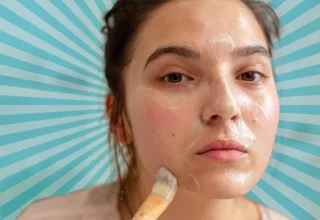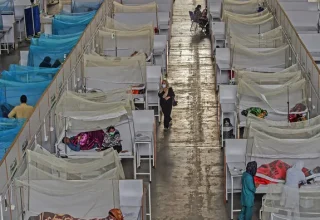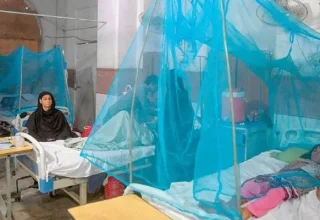
When you’re looking all summertime fine in your favorite hot-weather attire, the last thing you want to do is worry about body breakouts and blemishes. Unfortunately, when the temperatures rise, pimples start popping up even more.
Ugh!
It’s so annoying, especially since the season calls for shorts, swimsuits and tank tops. But the good news is that you don’t have to spend your summer broken out and covered up. Dermatologist Sean McGregor, DO, shares some watch-outs, dos and no-nos when it comes to managing summer acne.
Why the summer months bring on more breakouts
If you’ve been battling breakouts for a long time, you might notice that they get worse in the summer. You’re not the only one dealing with this. Dr. McGregor says recent studies have linked breakouts to warmer temperatures.
“Several studies have shown a correlation between the summer months and acne development. One of them even looked at Google trends to see if acne-related searches increased over the summer as opposed to other times of the year. But acne doesn’t get worse because of sun exposure. Most of the time, it’s related to increased oil production, sweating and more clogging of the pores that occur with the warmer temperatures.”
Hotter temps don’t seem to stop us from layering on sunscreen, lotion, body butter or oil to keep our skin glowing and moisturized. But when you mix in sweat, grime and other factors, that concoction can lead to more breakouts.
In the summer months, increased sweating can lead to clogged or obstructed pores. But we do know that certain sunscreens and moisturizers, especially those that are a little bit thicker, can contribute to more clogging and further the development of acne.”
Acne is a multifactorial condition. It can be influenced by certain hormonal factors and androgens that are present within your body. It also thrives in areas of your body where there’s increased oil production in your pores. Dr. McGregor says that triglycerides in these areas feed bacteria and this can cause more inflammatory forms of acne. But it all starts with obstructions in the pores and the formation of microcomedones, which are very tiny acne blemishes that can cause larger acne blemishes.
Treating summer acne
You’ve seen the commercials and the endless aisles of acne products in stores. With all of the options that exist, there has to be an over-the-counter solution that will work for your acne, right?
It depends.
If you’re dealing with milder forms of comedonal acne like blackheads and whiteheads, Dr. McGregor says that first-line options, or what you’d find in the drugstore, can be helpful. Most of these products are salicylic acid- or benzoyl peroxide-based. You can even find acne products that were once available by prescription only in stores now. Adapalene (Differin®) is one of them.
Use a foaming cleanser
“I typically recommend foaming facial cleansers during the summer months. During the winter months, switch to a hydrating or creamy facial cleanser to help hydrate your skin and prevent dryness from the colder weather.” Dr. McGregor adds that this isn’t necessarily a general rule. Your cleaner choice could vary based on your skin type. If you need help figuring out which cleanser is best for you, a dermatologist can help.
Avoid heavy lotions or creams
Of course, no one wants dry skin during the warmer months. However, Dr. McGregor says that what you use in the winter could make things worse for your skin during the summer.
“In the wintertime, it’s OK to use heavier lotions, creams and moisturizers to protect against some of the dryness that you experience in colder temperatures. During the summer months, you’ll want to switch to lighter moisturizers or a more water-based sunscreen to help prevent clogged pores.”
Remove dirt and sweat
No one wants to be a hot, sticky and smelly mess all day. So those brutal summer days might call for a shower or two. Dr. McGregor says it’s fine to wash off the sweat, dirt and grime but don’t overdo it.
I typically recommend showering or washing your face after working out or being outdoors and sweating. Twice a day is kind of the maximum per se. During this time of the year, more people want to exfoliate the skin and wash more frequently, so I do see a lot of skin irritation. It doesn’t necessarily cause acne to develop, but at the same time, washing and scrubbing tend to irritate the skin and that can make it harder to treat acne. My recommendation is twice a day as far as showers and washing your face. This includes after workouts or extended periods in the sun.”
Avoid popping those pimples
It doesn’t matter if you’ve watched hundreds of hours of pimple extraction videos. To preserve your skin, take a hands-off approach when those blemishes pop up. All of that squeezing and digging can lead to more inflammation, scars or infection.
“Everyone performs a little bit of bathroom surgery at some point in time, right? I occasionally do ‘acne surgery’ like extractions and other things in a clinical setting when a topical treatment isn’t 100% effective. But at home, you might not think about the downstream effects of picking at your blemishes. With acne, there’s the potential for scarring when you manipulate the skin. Pigmentary alteration (where you end up with lighter or darker areas) or infection can occur as well.”
What causes maskne?
While this summer looks drastically different from last summer, one thing might not change. With new COVID-19 variants floating around, some of us have decided to hang onto our masks. You know what that means maskne will be back with a vengeance this summer. So what have we learned in the last year about maskne?
Dr. McGregor breaks it down.
“Maskne is a subset of what’s called acne mechanica, a form of acne that is a result of friction or pressure on the skin. We see this a lot with repetitive use of things that come into contact with the skin. A mask can aggravate the skin and create more humidity and moisture for the lower half of your face. That kind of environment can cause obstructions in the pores and the development of microcomedones, which could potentially create more bacterial overgrowth within the pilosebaceous unit (the hair shaft, hair follicle, sebaceous gland and the muscle which helps hair stand on its end).”
To prevent maskne, Dr. McGregor suggests washing your face twice a day with a gentle cleanser to help remove any buildup. And of course, always wear clean masks.













































